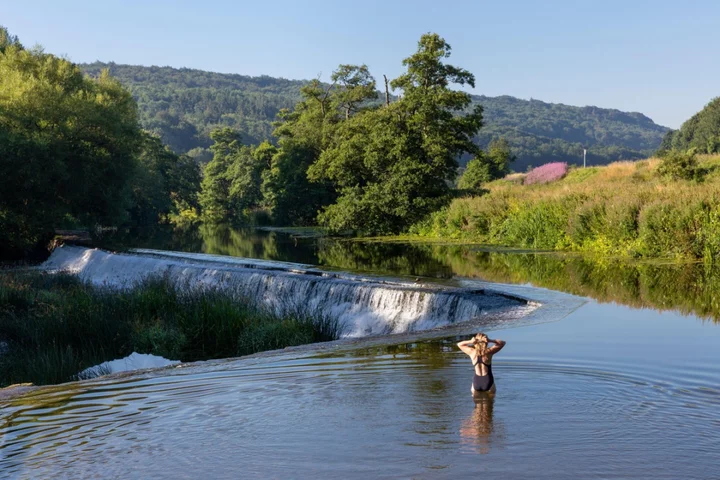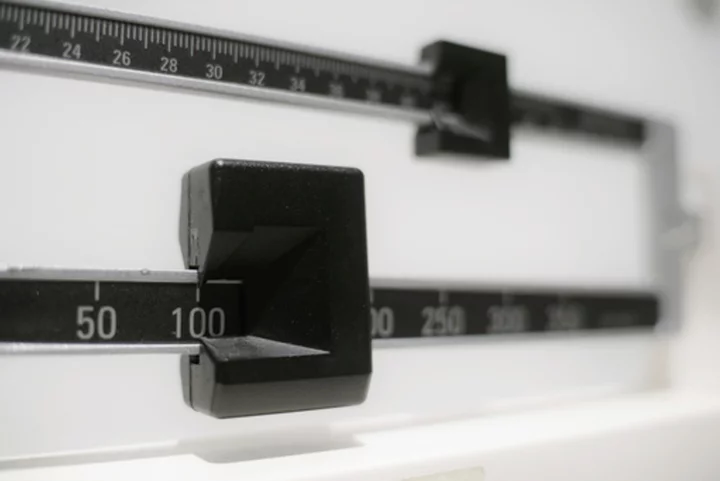
Top Explorer Urges Caution With Boom in Sea and Space Adventures
The demise of five people aboard a submersible touring the Titanic’s underwater wreckage has even the most prominent
1970-01-01 08:00

Sarah Ferguson details undergoing mastectomy to treat breast cancer: ‘It was only a shadow’
The Duchess of York has urged people to get their breasts checked after it was confirmed that she was diagnosed with breast cancer. Sarah Ferguson, 63, opened up about how she was preparing to undergo a single mastectomy, a procedure to remove a breast in order to treat the cancer. In the latest episode of her podcast with businesswoman Sarah Thomson, Tea Talks with the Duchess & Sarah, Ferguson revealed that she was scheduled for the surgery the day before they recorded. Emphasising how important it was to her to speak about having cancer, she said she thought of her father, Ronald Ferguson, and his experience with cancer in the Nineties. “What sprang to mind was my father, when everyone rang him and said, ‘Why, no one wants to hear from me – and I don’t mind if no one wants to hear from me, because I’m telling you that I am doing this,” she said. “I am telling people out there because I want every single person that is listening to this podcast to go and get checked.” On Sunday (25 June), a spokesperson for the duchess confirmed that she was diagnosed with breast cancer after having a routine mammogram screening. Reflecting on her diagnosis in the podcast, Ferguson said she was initially “really worried” about whether or not she should talk about it. “It wasn’t until we talked it through before this podcast that actually… hold on a minute, you’ve done so much work. You’ve now caught this cancer in time, I pray, and then right now, if I can talk about it publicly, then everybody, please, don’t wait,” she said. Ferguson also praised the NHS staff at the Royal Free Hospital in London and said they did “amazing work” in catching her cancer. “Had it not been for that extraordinary injection in you to contrast, and it shows the contrast and it shows where to go – if I hadn’t done that, it was only a shadow, they wouldn’t have found out that it needs to be immediately sorted,” she added. Ferguson’s spokesperson said yesterday: “She was advised she needed to undergo surgery which has taken place successfully. The Duchess is receiving the best medical care and her doctors have told her that the prognosis is good. She is now recuperating with her family.” He continued: “The Duchess wants to express her immense gratitude to all the medical staff who have supported her in recent days. “She is also hugely thankful to the staff involved in the mammogram which identified her illness, which was otherwise symptom-free, and believes her experience underlines the importance of regular screening.” Ferguson, who was married to the Duke of York from 1986 to 1992, and divorced in 1996, is reportedly recovering at Royal Lodge in Windsor, which she still shares with Prince Andrew. For more than 30 years, she has worked with the Teenage Cancer Trust and frequently campaigns for breast cancer awareness. In 2019, during the Breast Cancer Foundation’s annual gala, she said in an interview: “It’s that hidden, frightening thing, the word cancer, the big C. Then on top of that is the word ‘breast’, people just don’t use it. “The secret for the Breast Cancer Foundation is to spread awareness and to say it’s OK. It’s not OK, of course it’s awful. But if you have got it or you worry, or you think you may, go and have it checked and we are here to support you.” Ferguson’s father, Ronald Ferguson, had prostate cancer in 1996 and also had skin cancer. He died in 2003 at the age of 71 of a heart attack. Read More Gongs, chanting and Celtic Shamanism: What I learnt from a day at the Glastonbury Healing Field Sarah Ferguson, Duchess of York, has surgery for breast cancer A woman stopped tidying up after her husband accused her of doing ‘nothing’. Then she filmed the results
1970-01-01 08:00

Sarah, Duchess of York has operation for breast cancer: What to know about mammograms
Sarah, Duchess of York has revealed she is recovering from an operation after being diagnosed with breast cancer during a routine mammogram. Here, the PA news agency looks into who can get a mammogram and what happens. What is a mammogram? A mammogram is a breast x-ray which looks for signs of cancer, according to the charity Breast Cancer Now. How can I get a mammogram? Patients can receive a mammogram to look for cancer that may be too small to see or feel as part of breast screening. Women aged between 50 and 71 are automatically invited for breast screening through their GP practice every three years. Those over the age of 71 can continue to have breast screening every three years by contacting their local screening unit through the NHS website or through their GP. The sooner breast cancer is diagnosed, the more effective treatment is likely to be, reducing the risk of more extensive surgery. Women may also be referred to a breast clinic for a mammogram by their GP if they have symptoms or a breast change that requires investigating. What are the symptoms of breast cancer? The first symptom of breast cancer that most women notice is a lump or an area of thickened tissue in their breast, the NHS website states. Women are advised to see their GP if they experience a new lump or area of thickened tissue in either breast, a change in the size or shape of one or both breasts or fluid discharge from either nipple. Other symptoms include a lump in either armpit or a change in the skin of the breasts, including puckering, scaly or itchy skin, crusting or a rash. How can women check their own breasts? As it is possible for breast cancer to develop in the three years between each mammogram, it is important for women to check their breasts regularly for any signs of cancer, according to the charity Breast Cancer Now. The NHS Breast Screening Programme recommends that women know what is normal for them, to look at their breasts and feel them, to know what symptoms to look for and to report any changes to a GP without delay. To check the breasts, the NHS website recommends looking at them and feeling each breast and armpit up to the collarbone. It may be easier to do this in the shower or bath. Women can also look at their breasts in the mirror both with their arms raised and by their sides. What happens during a mammogram? During a mammogram, a female doctor asks the patient to remove their clothes from the waist up and stand in front of the mammogram machine. The breasts are placed one at a time on the x-ray machine and images of each breast are taken. The scan itself should only take a few minutes, while the whole appointment should take about half an hour, according to the NHS website. The results of the mammogram are sent by post to the patient and their GP. According to Breast Cancer Now, around 4% of women are called back to a breast clinic after routine screening for more tests. While most women recalled will not have breast cancer, the follow-up appointment may involve a breast examination, further scans – such as a mammogram or an ultrasound – or a biopsy – where a small sample of tissue is taken. Breast cancer facts and figures Breast cancer is the most common type of cancer in the UK, and about one in seven women are diagnosed with the disease in their lifetime, according to the NHS website. More than 80% of breast cancers occur in women over 50 and the risk continues to increase with age. Mammograms are not often used in women under 40 as younger women have denser breast tissue, which can make the x-ray image less clear and changes harder to identify, according to Breast Cancer Now. However, for women with a family history of breast cancer, UK guidelines recommend they should start having screening mammograms every year in their forties. Screening prevents an estimated 1,300 deaths from breast cancer each year in the UK, according to Breast Cancer Now.
1970-01-01 08:00

Wild swimming: When is it safe to go in?
When warmer weather arrives, many of us feel the urge to cool off with a refreshing dip at the nearest pool, pond or beach. A paddle is a pleasant way to beat the heat, it can boost your health too. “The benefits of swimming and dipping in open water are well documented,” says Lee Heard, charity director at Royal Life Saving Society UK. “Not only does being in or on open water allow new adventure, it also has documented benefits for both physical and mental wellbeing.” Research from Next found that 33% of people would look to wild swimming to find relief from muscle aches and pains, while 28% of those facing stress see it as a remedy. “Many of us only swim outdoors during the summer season,” says Ella Foote, founder of The Dip Advisor and author of How to Wild Swim: What to Know Before Taking the Plunge. But just because the sun is out doesn’t mean wild swimming is less dangerous, she says: “Learning to swim at some point in your life isn’t enough and being a fit, healthy person on dry land isn’t the same as being water fit.” There were 226 deaths in the UK from accidental drownings in 2022, according to the RNLI. Heard says: “The basic principles of open water safety, combined with knowledge and understanding of the hazards, can increase the enjoyment of open water and significantly reduce the number of incidents that occur each year.” These are the safety considerations to take into account before deciding whether to wade in… Look for lifeguards “There are a great number of open-water sites which are lifeguarded and we would urge people to go to lifeguarded venues if they are looking to take part in open water swimming,” says Heard. Use the RNLI website to find your nearest lifeguarded beach. “Lifeguards are trained professionals who can ensure your safety whilst out on the water and provide assistance should you need it,” Heard continues. “There are also a number of organised events around the country which have lifeguards on duty, so we urge people to attend those events.” Check the conditions If you’re swimming somewhere without a lifeguard, you must be aware of the potential risks.”If swimmers are aware of the potential risks and dangers, then this enables them to do a risk assessment before entering the water,” says Heard. Risks to consider include, he says: “The depth of the water – this changes and is unpredictable; underwater objects and hazards may not be visible; strong currents can rapidly sweep people away; and uneven banks and river beds.” “The weather is more changeable in coastal areas; wind can make a huge difference in the sea and how it behaves,” says Foote, who recommends checking the Tide Times or Surfline websites and following RNLI advice on rip currents. “If you plan a river swim it is worth remembering that water travels faster when a river is shallow, narrow or after spells of heavy rain,” she adds. Know your limits “Can you tread water while keeping your head above the water? Can you float on your back? Could you swim 25 meters without stopping?” asks Foote. “These are the very basic skills for keeping yourself safe in open water and if you are unsure – don’t get in.” While it can be tempting to plunge in on a hot day, never jump or dive without testing the water first. “Enter within your depth and get a feel for the water before swimming,” Foote continues. “Ensure you know where you plan to get out before getting in, sometimes it is easier to get in the water than get out.” And always trust your instincts: “If you’re at the water and something doesn’t feel right, trust that. If the water doesn’t look, or smell right, don’t get in. Outdoor swimming is joyful, but be safe.” Beware of the cold “The shock of cold water can make swimming difficult and increase the difficulty in getting out of the water,” Heard says, even during hot weather when water temperatures are rising. “The water will always be cooler than your core body temperature, so you will experience a gasp and chill on entry,” says Foote. “While it might be warm in the shallows, in deeper water it will be cold at the bottom and that can feel very different when jumping in, which can cause cold water shock and be fatal. “This is also true in coastal areas – the sea is still cool at this time of year.” Don’t trespass Choosing where to swim isn’t just about finding a safe and picturesque spot – you’ve got to make sure you’re not trespassing on private land. “As a rule, avoid reservoirs and quarries – they are often private facilities and are not designed for swimming,” says Foote. “As well as trespassing, many have steep sides and while you might get in okay, getting out can be harder. Some reservoirs have damns, towers and aerators that present a real risk to swimmers.” You should always check whether you’re allowed to swim in a lake in a national parks. The NOWCA network lists safe open water swimming venues. Take the right kit Depending on the weather and water temperature, you may need more than just a bikini or shorts for your swim. “We always recommend going swimming with a friend, wearing appropriate clothing such as a wetsuit, a tow float and a bright-coloured swimming hat,” says Heard, so that you’re more visible if you need help. And don’t forget that while a rush of endorphins can help when you’re in the water, you may feel more chilly once you get out. Heard adds: “It’s vital to also ensure that when you get out you have appropriate clothing to keep you warm after the swim.” Read More Charity boss speaks out over ‘traumatic’ encounter with royal aide Ukraine war’s heaviest fight rages in east - follow live Prince of Wales to launch initiative aimed at ending homelessness Beatrice enjoys Glastonbury as princess is spotted on final day of festival Kate triumphant after Frankie Dettori’s win at Royal Ascot
1970-01-01 08:00

A second life for EV batteries? Depends how long the first is
By Nick Carey, Paul Lienert and Victoria Waldersee LONDON Global automakers have touted plans to re-use electric vehicle
1970-01-01 08:00

What to stream this week: 'The Bachelorette,' Idris Elba, The Weeknd, Sarah Snook and 'Jack Ryan'
This week’s new entertainment releases include a new album from Lucinda Williams, the kickoff of the 20th season of the reality dating show “The Bachelorette” starring a 27-year-old therapist from Georgia who was featured on the last season of “The Bachelor,” and Idris Elba is stuck on the worst flight ever in the new series “Hijack” for Apple TV+
1970-01-01 08:00

Seychelles Central Bank Sees Deflation Ending as Rupee Weakens
Deflation in Seychelles is expected to be short-lived because of a weaker currency and higher import prices, the
1970-01-01 08:00

No more needles? A daily pill may work as well as Wegovy shots to treat obesity
Losing significant amounts of weight may soon be as easy as taking a daily pill
1970-01-01 08:00

Talent Shortages Hampering Japan Growth, AmCham President Says
Shortages of the “right kind” of talent are holding back Japanese growth in sectors from tourism to the
1970-01-01 08:00

FAA lifts ground stop at DC-area airports after pausing departures for repairs at air traffic control facility
Flights to DC-area airports are able to resume after the Federal Aviation Administration lifted a ground stop made earlier Sunday evening due to equipment problems at an air traffic control facility in Virginia.
1970-01-01 08:00

Chinese Tourists Can Help Pull Thai Baht Out of Political Morass
Thailand’s baht slid to the lowest level since March last week but there are reasons to believe it
1970-01-01 08:00

LGBTQ+ Pride Month reaches its grand crescendo on city streets from New York to San Francisco
LGBTQ+ revelers and allies are partying coast to coast for the grand crescendo of Pride Month
1970-01-01 08:00
